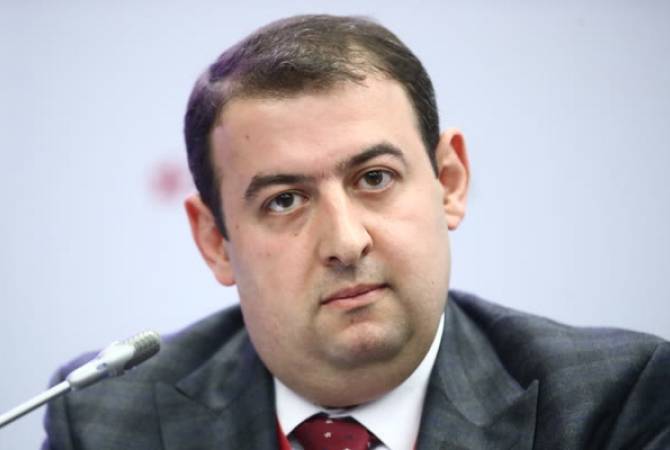‘Role of the future’s media is to hold the light’ – ARMENPRESS director Aram Ananyan’s speech at 2018 SPIEF Global Media Summit
7 minute read

YEREVAN, MAY 24, ARMENPRESS. Aram Ananyan, Director of ARMENPRESS, Armenia’s state news agency, delivered a speech at the global media forum within the framework of the 2018 St. Petersburg International Economic Forum (SPIEF) on May 24 in St. Petersburg, Russia.
The panel discussion was titled The Future Of Journalism In Times of New Challenges.
Below is the transcript of the full speech of Mr. Ananyan.
“Thank you, dear colleagues for your kind invitation. I am really pleased to be here, at this very important panel on the future of our industry.
And I just would like to add more optimism on our predictions or a guessing game, for a very simple reason. Each and every new challenge first of all is an opportunity that galvanizes our professional and technological advancement.
Meanwhile it is obvious, that the news agencies are the most adaptive actors in any change. The situation nowadays can be characterized as a form of cohabitation of traditional journalism, new media, social networks, citizen- journalism and artificial intelligence.
Some might consider social networks and AI as an augmentation tool for professional journalism, while others as a threat or an open call for everybody to dig deeper into a profession even without 1-0-1 level of professional expertise: in the meantime, each consecutive year the barriers for the new players to enter the news market, be those professional, financial, technological, or even intellectual gradually slide down.
Technology is changing our practices by making routine reporting and fastening insight generation. For small newsrooms, this is a chance to take a very special niche of creating compelling stories, with local expertise, which is true also for myagency, Armenia’s state news agency ARMENPRESS – that celebrates 100 years this year.
A significant portion of our routine reporting is narrated by a software that we developed with the Technological Development Center, a non-profit foundation, based in Yerevan.
The variety of sources and the alarming behavior of content distributors such as Facebook, Google, Twitter that frivolously determine the volume of our content our users receive create archipelagos of communication, where everybody claims to have the monopoly over what he or she thinks is true.
As far as we see, traditional media- especially news agencies are in the avant-garde of technological development of AI in news-making and gathering, use of social media, messaging, live streams and push notifications.
By now, I suppose that developments do not look like a Trojan horse, and we are not the ones to call "Beware of Greeks bearing gifts" [Timeo Danaos et dona ferentes, Aeneid, Virgil].
Is the future of traditional journalism under threat? I think no. Will there be a demand for the traditional media in ten years? I suppose absolutely yes.
The most important challenge in the era of uncertainties for us is not to forget about our mission. Our mission of reporting. Our mission of true reporting, our mission of journalism, not to forget why are we in this industry, not to forget our moral obligations in making our journalistic decisions. The role of the future’s media is to hold the light. As some of our colleagues truly say, that - democracy dies in darkness.
What we observed in our recent practices, and I suppose it is much alike with yours - our audience becomes more and more demanding. They do not just want to see the interpretation of events; they want to know what happens here and now and are eager to become an integral part of the news.
In order To develop our capacities we need to create a new toolbox, literary if it is necessary to knock to each and every person in our audience.
These trends we saw in the recent developments in my country in Armenia, that many of us, our professional community call Armenia’s Velvet Revolution.
We are grateful to dozens of our international partners, who are sitting at this panel, who relied on ARMENPRESS’s factual reports, who relied on fast and fact-checked information and we are very grateful for your trust and support. We tried to do our best, we tried to cover everything that happened in Armenia everything that continues to happen in Armenia, we were very fast, we kept the balance and the high citation index that we saw in our international partners says and proves that our job was demanded.
To conclude: reality is the following: aggregators will end up exactly there, where the real reporting will start. Neither social media, nor artificial intelligence is a cult or a panacea. And I want to recall, a friend sitting next to me, an intellectual whom I respect very much, and in this forum 2 years ago he said that the key prediction for artificial intelligence, and I want to repeat Giuseppe [Cerbone] that the ability of intellect and intelligence is to adapt to the reality and to adapt the reality. This is what you cannot do artificially and what aggregators lack the most. By now, we didn’t see anything in the artificial intelligence to identify the breaking news or do war reporting or an in-depth interview. And let me just conclude here, my give and take, and thank you all very much. Thank you.”
Panelists in addition to Mr. Ananyan included TASS General Director Sergey Mikhaylov, Kyodo News Executive Director Hiroki Sugita, AP Vice President Ian Phillips, ANSA CEO Giuseppe Cerbone.
More than 50 executives of about 30 major news agenciesfrom Armenia, Azerbaijan, Belarus, Bulgaria, Great Britain, Vietnam, Germany, Egypt, Iran, Spain, Italy, Kazakhstan, China, Cuba, Lebanon, Macedonia, Russia, Serbia, US, Turkey, Japan are participating in the media summit, as well as the business and cultural program of 2018 SPIEF.
ENGLISH: Editor/Translator -Stepan Kocharyan

